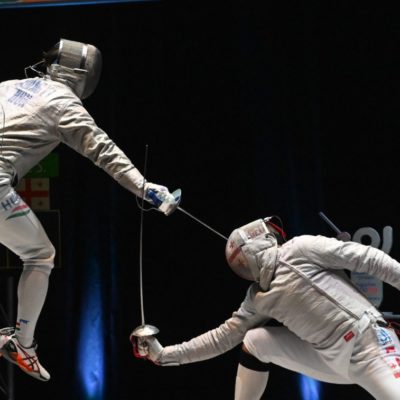Before the tournament begins, you check out the seeding table not just to see where you are seeded, but where everyone else is seeded too. Then you check it after the round of pools. Then you check it after your DEs. And then again at the end of tournament. And then again on Ask Fred.
How many of you do this?
Just what are you looking for (besides which strip you’re fencing on)? You may be looking at a lot of names besides your own. Looking at those names can create expectations concerning a bout before it has even been started. Your expectations may include how you anticipate to place in the tournament, based on who you expect to beat, and who you expect to lose to.
You may see that you’re going to fence an opponent who has beaten you in the past. You may start to feel apprehensive about the likelihood of losing again. You start to doubt yourself, and might even verbalize your conviction of a future loss while talking to teammates. As a result, you fence as if you have already lost the bout. Your fencing lacks energy, and you’re basically handing touches to your opponent.
On the other hand, you may see that you’re facing off against an opponent whom you’ve beaten before, and you start to get excited. It seems that your first bout will be an easy one, and you fence without trying to win. Before you know it, you’re down in a bout you feel that you should be easily winning.
While both scenarios are bad, what’s even worse is having unreal expectations. This refers to fencers who are very unlikely to do well in competition getting upset that they lost. They often forget that no matter what size a tournament is, only ONE person can win it. Also, there are fencers who expect to do poorly in a tournament and don’t give themselves a chance. They let the competition get the better of them, before they even fence at all!
Sound like you any of these situations are you?
Consider learning to fence without expectations. It’s easier than you think.
Try these tips:
• Don’t look at the seeding list or the tableau.
Sounds crazy but give it a try. If you need to find out where you’re fencing, ask an experienced fencer to help you. Not looking at the seeding chart forces you to fence your hardest no matter who you fence, and you won’t waste your time fretting over whether you’re going to win or lose. If you truly believe in your abilities, it doesn’t matter who you’re fencing because you will fence your absolute best.
• Look at losses as opportunities to learn.
We all have bad days. One bad tournament doesn’t make you a bad fencer; just less than par that day. View your loss as a temporary set back, and continue to prepare for your next tournament. Even the very best fencers did not win every single tournament of their entire career. They’ve lost too, just like the rest of us. The difference is that they got past it and used the loss to their advantage.
• Keep your ego in check.
One good tournament doesn’t make you the best fencer in the universe either. View your win as progress in your abilities. Future wins are not handed out; you still have to earn them. Stay diligent in practice and keep your ego in check.
• Know What you CAN expect.
What you can expect it is that the competition will be tough, you will make mistakes, referees will mess up calls, equipment will break, and there will be painful moments. You can also expect that you will triumph over any obstacles and solve problems as they arise. You can do this without losing your cool or your focus. These are better expectations to have about your fencing than the end result.
Having the wrong kind of expectations can ruin how you feel about your fencing. Competitors can feel good whether they won or lost, depending on how they felt about themselves going into the competition. Give yourself the best advantage you can by eliminating away unnecessary pressures by not having any expectations.





